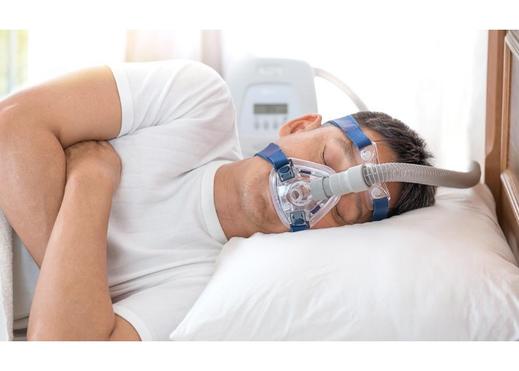Does CPAP Equipment Really Help with Sleep Apnea?
Aug 16, 21

Are you also asking how to cure Sleep Apnea? We might have the perfect solution for you. If you are told to treat sleep apnea, you can use a Continuous Positive Airway Pressure (CPAP) machine. You may want to know how the CPAP machine works. We will discuss about how these devices reduce snoring and sleep apnea with air pressure.
But first, let us understand what CPAP equipment is, why should you use it and how to use it. CPAP is the abbreviation of Continuous Positive Airway Pressure Therapy, which is a treatment method for patients having sleep apnea and other sleep issues. The CPAP machine uses mild air pressure to keep the airway open and is usually used by patients who have difficulty breathing during sleep.
What CPAP Therapy Looks Like:
You can wear CPAP equipment every night whenever you sleep. The CPAP machine will have one of the following:
- a mask covering your nose and mouth
- a mask that only covers the nose, called nasal continuous positive airway pressure, or NCPAP (this kind of mask is the most common)
- prongs for your nose
- The motor that blows air into the duct.
Why It is done?
CPAP is a very effective non-surgical treatment for obstructive sleep apnea syndrome. It is the first and most widely used treatment for adults. Although there is an obvious adjustment period for CPAP treatment. In the long run, this treatment can pay off really well. Few advantages to CPAP treatments are:
- Keeps the airway open while sleeping
- Reduces or completely eliminate snoring.
- Improves sleep quality.
- Reduces or eliminates daytime sleepiness, which is a symptom of sleep apnea.
- Reduces high Blood Pressure
Benefits of CPAP Therapy
The benefits of CPAP therapy are the same as the benefits that people get from a good night’s sleep and regular rest. CPAP treatment helps effectively control the symptoms and dangerous side effects caused by obstructive sleep apnea. If supported, treatment should help alleviate sleep apnea and other health problems, such as high blood pressure and diabetes and sometimes insomnia as well.
Treatment for Sleep Apnea
For mild cases of sleep apnea, your sleep therapist might only recommend lifestyle changes, such as losing weight or quitting smoking. If you have nasal allergies, your sleep specialist might advise you to treat the allergies. If these measures do not improve your signs and symptoms or if you have moderate to severe sleep apnea, there are many other treatment options.
Continuous positive airway pressure (CPAP)
If you have moderate to severe sleep apnea, using a device that builds air pressure through your mask while you sleep may help. With CPAP, the air pressure is slightly higher than the ambient air, enough to keep the upper respiratory tract unobstructed to prevent apnea and snoring. Although CPAP is the most common and reliable treatment for sleep apnea, some people find it troublesome or uncomfortable. Some people do not get comfortable with a CPAP machine, but through practice, most people learn to adjust the tension of the mask strap to obtain a comfortable and safe fit. You must try different types of masks to find the one that suits you. If you encounter problems, please do not stop using the CPAP machine instead ask your doctor about what changes can be made to improve your comfort.
Let’s Also Look at Some of the Drawbacks of This Device:
Although the CPAP machine can help prevent apnea during sleep, it also has some disadvantages, also some people stop using the CPAP machine because of the side effects. Few of these side effects are the following:
- Claustrophobia
- Felling of discomfort while sleeping
- Nasal congestion
- Dry mouth
The CPAP machine releases a stream of oxygen-enriched air into your airway through a mask and catheter to treat sleep apnea. Compressed air prevents your airway from collapsing, so you can keep breathing while you sleep. There are different types of CPAP machines. The prescription for the type of CPAP machine your doctor prescribes depends on what type of sleep apnea you have, how comfortable you are wearing your CPAP mask, and what kind of breathing and sleeping patterns you have. Some people feel uncomfortable with CPAP equipment.
We must have answered almost all of the questions related to how to cure Sleep Apnea. If this helps, discuss other treatment options with our sleep specialist to keep your airway open while you sleep.


